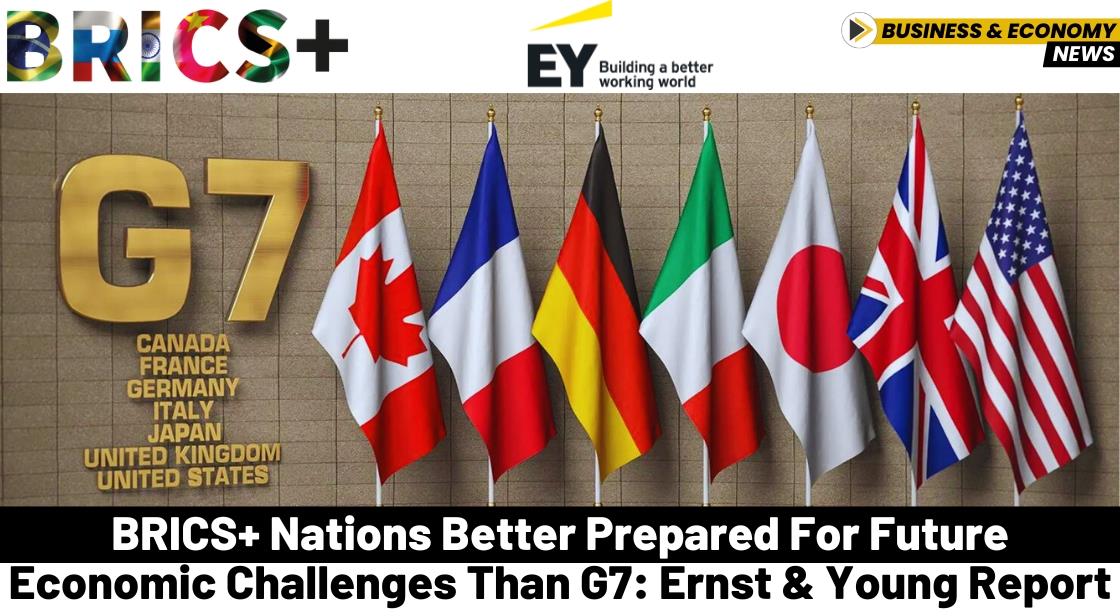BRICS+ Nations Better Prepared for Future Economic Challenges Than G7: Ernst & Young Report

News Synopsis
The BRICS+ group of nations, consisting of Brazil, Russia, India, China, South Africa, and other emerging economies, is better positioned to tackle future economic crises compared to the G7 countries, according to a recent report by Ernst & Young (E&Y), a leading global consulting firm. The report highlights several fiscal advantages that place the BRICS+ nations in a more resilient position, such as a lower debt-to-GDP ratio and greater access to primary deficits, making them better equipped to handle financial downturns.
BRICS+ Fiscal Strengths Over G7 Nations
The E&Y report emphasizes that the BRICS+ nations have a more favorable fiscal position than the G7 countries—which include the United States, Canada, France, Germany, Italy, Japan, and the United Kingdom—primarily due to their lower debt-to-GDP ratios. This lower debt burden allows the BRICS+ countries greater flexibility in handling future economic crises.
The report states, "The BRICS+ group is better placed to fiscally combat any future major economic crisis, as it has a lower debt-to-GDP ratio, access to higher primary deficits, and a near-equal excess of growth over interest rates compared to the G7 group."
These fiscal strengths, according to E&Y, make BRICS+ nations more adaptable to changes in global economic conditions. They benefit from higher economic growth rates, which tend to outpace interest rate increases, providing more room for fiscal maneuverability during times of economic stress.
G7 vs. BRICS+ in Global Economic Influence
While the G7 nations continue to have a larger share of the world's GDP when measured at market exchange rates, the BRICS+ group is gaining ground, particularly when assessed using Purchasing Power Parity (PPP). The report highlights the changing dynamics in global economic power: the G7's share of global GDP has been steadily declining, while the BRICS+ countries have been increasing their global economic footprint.
-
By 2029, the BRICS+ nations are projected to hold 29.2% of global GDP at market exchange rates, and 38.3% in PPP terms.
-
In contrast, the G7's share is expected to be 42.4% at market exchange rates and 27.5% in PPP terms by 2029.
This shift reflects the growing economic influence of emerging economies like India and China, which are key members of the BRICS+ group.
The Decline of G7's Share of Global GDP
The report sheds light on the steady decline of the G7’s share of global GDP over the years. In 2002, the G7 accounted for 64.4% of the world’s GDP. However, by 2024, this figure is estimated to fall to 44.4%, a sharp decline of 20 percentage points. Projections from the International Monetary Fund (IMF) indicate that the G7’s share will drop further to 42.4% by 2029.
On the other hand, the BRICS+ group has experienced a significant rise in its share of the global economy. In 2002, BRICS+ accounted for only 10.1% of global GDP. However, by 2024, this figure is projected to grow to 27.3%, an increase of 17.2 percentage points. By 2029, BRICS+ is expected to further expand its share to 29.2%.
BRICS+ Nations' Growing Influence
As the BRICS+ countries continue to increase their share of global GDP, their economic influence on the world stage is becoming more prominent. The E&Y report emphasizes that the group’s growth is particularly impressive when viewed in terms of PPP, which takes into account differences in living costs and economic productivity between nations.
By 2029, the BRICS+ nations will have an estimated 38.3% share of global GDP in PPP terms, a significant lead over the G7, which will hold 27.5%. This shift in economic balance highlights the growing role of BRICS+ nations in shaping global economic trends and their increasing ability to influence global markets.
Conclusion: The Future of Global Economic Power
In conclusion, while the G7 nations continue to play a significant role in global economic affairs, the BRICS+ countries are steadily gaining ground. The E&Y report suggests that the BRICS+ group is better prepared to manage future economic challenges, thanks to its more favorable fiscal conditions, higher economic growth rates, and a lower debt burden. As the global economy continues to evolve, the BRICS+ nations are positioned to have a greater influence on economic policy and market dynamics, challenging the long-standing dominance of the G7.
You May Like









